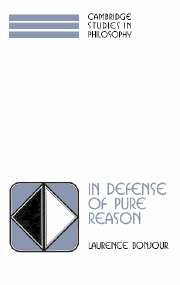Book contents
- Frontmatter
- Contents
- Preface
- Acknowledgments
- 1 Introduction: the problem of a priori justification
- 2 In search of moderate empiricism
- 3 Quine and radical empiricism
- 4 A moderate rationalism
- 5 Epistemological objections to rationalism
- 6 Metaphysical objections to rationalism
- 7 The justification of induction
- Appendix: Non-Euclidean geometry and relativity
- References
- Index
7 - The justification of induction
Published online by Cambridge University Press: 08 January 2010
- Frontmatter
- Contents
- Preface
- Acknowledgments
- 1 Introduction: the problem of a priori justification
- 2 In search of moderate empiricism
- 3 Quine and radical empiricism
- 4 A moderate rationalism
- 5 Epistemological objections to rationalism
- 6 Metaphysical objections to rationalism
- 7 The justification of induction
- Appendix: Non-Euclidean geometry and relativity
- References
- Index
Summary
INTRODUCTION
Our discussion of a priori justification so far has been in the main relentlessly abstract, with only a few of the most obvious examples to enliven the way. While this seems to me appropriate where it is the very existence of non-tautological a priori justification that is at issue, it does leave the issue of the scope of a priori justification almost entirely unillumined. For all that has been argued so far, it would be possible that a priori justification of the rationalist kind, though genuinely existent, is confined entirely to the general kinds of examples discussed in §4.2. And if this were so, then such justification, though perhaps important in these limited areas, would have little significance for human knowledge in general and would in particular do almost nothing to solve the problem of observation-transcendent inference raised in §1.1. Radical empiricists would indeed be mistaken in their central claim, but their error would be of little consequence; their general epistemological position would still be closer to the truth than that of the rationalist in the ways that matter most.
My conviction is that, on the contrary, rationalistic a priori justification is of crucial importance for epistemology and indeed for philosophy generally.
- Type
- Chapter
- Information
- In Defense of Pure ReasonA Rationalist Account of A Priori Justification, pp. 187 - 216Publisher: Cambridge University PressPrint publication year: 1997



